|
|
|
Sort Order |
|
|
|
Items / Page
|
|
|
|
|
|
|
| Srl | Item |
| 1 |
ID:
133702
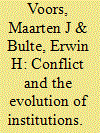

|
|
|
|
|
| Publication |
2014.
|
| Summary/Abstract |
The impact of armed conflict may persist long after the end of war, and may include a lasting institutional legacy. We use a novel dataset from rural Burundi to examine the impact of local exposure to conflict on institutional quality, and try to 'unbundle' institutions by distinguishing between three dimensions of the institutional framework: property rights security, local political institutions, and social capital. We find that conflict exposure affects institutional quality, and document that the impact of conflict on institutional quality may be positive or negative, depending on the institutional measure. Specifically, exposure to violence strengthens in-group social capital and promotes tenure security. However, the appreciation for state institutions is negatively affected by exposure to violence. We find no evidence consistent with design-based theories of institutional quality, or the idea that institutional quality is enhanced by interventions of (non)state external actors. Instead our findings provide some support for the theory of parochial altruism. Our results emphasize the importance for policymakers to consider autonomous responses to conflict when designing development programs. They further imply some caution for actors seeking to reform local institutions through top-down interventions.
|
|
|
|
|
|
|
|
|
|
|
|
|
|
|
|
| 2 |
ID:
094984
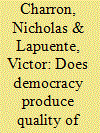

|
|
|
|
|
| Publication |
2010.
|
| Summary/Abstract |
This article analyses the effects of political regimes over state capacity or the quality of government (QoG): Do democratic states perform better than authoritarian ones? Previous studies point to a nonlinear relationship between democracy and government quality. It is argued here that QoG is a function of both forces of supply (leaders who have the power to make reforms) and demand (citizens' desire for mid- to long-term investments over short-term needs), the latter of which is a function of economic development. In democratic states, leaders have stronger incentives to improve QoG after a certain degree of wealth is reached, while in poorer countries they have little incentive for long-term bureaucratic investments. Thus it is predicted that the relationship between democracy and QoG is conditional, based on economic development. With over 125 countries in the sample, this hypothesis is tested using time-series panel data and spatial models, and strong empirical support is found.
|
|
|
|
|
|
|
|
|
|
|
|
|
|
|
|
| 3 |
ID:
133726
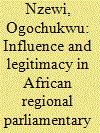

|
|
|
|
|
| Publication |
2014.
|
| Summary/Abstract |
This article examines non-legislative avenues for parliamentary influence and legitimacy in the Pan-African Parliament (PAP). It argues for an incremental approach to increasing the powers of the PAP. To make this case, the paper first expounds on the composite nature of regional parliaments, showing the convergence of complex political and institutional issues that make Regional Parliamentary Assemblies unique parliamentary entities. Given the unsuccessful attempt by the PAP to increase its legislative powers through an amendment of its protocol, the aim is to make an alternative argument for legislative powers by locating the legal and institutional legitimacy and influence drivers for the PAP.
|
|
|
|
|
|
|
|
|
|
|
|
|
|
|
|
| 4 |
ID:
099579
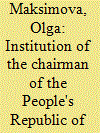

|
|
|
|
|
| Publication |
2010.
|
| Summary/Abstract |
The article examines the formation and development of the institution of the Chairman of the PRC from the time of the inception of the People's Republic of China (October 1, 1949) until this day. The emergence and development of the institution of the Chairman took place under the influence of certain historical and national specific features and traditions, naturally, with due account of the necessity and expedience of the creation of this political institution in concrete political conditions.
|
|
|
|
|
|
|
|
|
|
|
|
|
|
|
|
| 5 |
ID:
131504
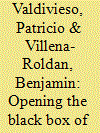

|
|
|
|
|
| Publication |
2014.
|
| Summary/Abstract |
This paper introduces a rational choice model for multiple kinds of participation to empirically investigate several theoretical determinants of social capital (SC) formation. The framework is rich enough to investigate the importance of individual variables, social/peer effects, endogenous trust, political-institutional, and inequality factors as sources of participation. We show that the aforementioned contextual factors explain SC formation for Chile, but their relative importance varies for each kind of participation. Our second application compares individual-level determinants of SC formation among the largest democracies in the Americas. Gender, age, education, and race show heterogeneous effects across countries. Overall, negative interpersonal trust shocks generate participation increments, and possibly motivate engagement in trustworthy networks. Idiosyncratic factors behind participation and trust are positively correlated, suggesting a common SC stem that manifests in multiple ways. Hence, our empirical approach to SC formation uncovers factors hidden by assumptions in some previous literature.
|
|
|
|
|
|
|
|
|
|
|
|
|
|
|
|
| 6 |
ID:
186947
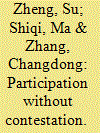

|
|
|
|
|
| Summary/Abstract |
How do non-governmental organizations (NGOs) advocate public policies? What impacts their advocacy strategies? Although scholars have addressed these questions in a democratic context, less is known about NGO advocacy under powerful authoritarian regimes. Using China as a case study, we develop an institutional explanation of NGOs’ policy advocacy patterns and explore the impacts of NGO autonomy. Using a unique dataset of registered NGOs in three Chinese provinces, we find that NGOs with more autonomy tend to conduct direct negotiations with the government more actively (more political advocacy). However, these more autonomous NGOs are likely to be more hesitant to mobilize society from the bottom up (less social advocacy). These findings enrich our knowledge of social actors’ roles in the policymaking process in China.
|
|
|
|
|
|
|
|
|
|
|
|
|
|
|
|
| 7 |
ID:
138446
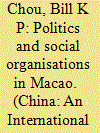

|
|
|
|
|
| Summary/Abstract |
Major social organisations in Macao fulfil the political and social functions of political mobilisation and participation, the provision of social services on behalf of the government and the co-optation of social forces by being the agents of the Chinese government in the execution of its united front policy and the vehicles of the Macao government for winning supporters. From the perspective of historical institutionalism, Macao’s political design, which centres on social organisations and dates back to the Portuguese era, is path-dependent on the modified corporatist model. By embedding social organisations into its political institution, the state can mobilise social forces to undertake state functions and weaken political opposition. Major social organisations face major challenges in their conflicting political and social functions, which weaken their ability to fulfil the role of the government’s partners and allies.
|
|
|
|
|
|
|
|
|
|
|
|
|
|
|
|
| 8 |
ID:
133015
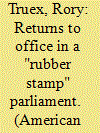

|
|
|
|
|
| Publication |
2014.
|
| Summary/Abstract |
Are there returns to office in an authoritarian parliament? A new dataset shows that over 500 deputies to China's National People's Congress are CEOs of various companies. Entropy balancing is used to construct a weighted portfolio of Chinese companies that matches companies with NPC representation on relevant financial characteristics prior to the 11th Congress (2008-2012). The weighted fixed effect analysis suggests that a seat in the NPC is worth an additional 1.5 percentage points in returns and a 3 to 4 percentage point boost in operating profit margin in a given year. Additional evidence reveals that these rents stem primarily from the "reputation boost" of the position, and not necessarily formal policy influence. These findings confirm the assumptions of several prominent theories of authoritarian politics but suggest the need to further probe the nature of these institutions.
|
|
|
|
|
|
|
|
|
|
|
|
|
|
|
|
|
|
|
|
|